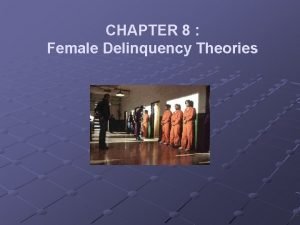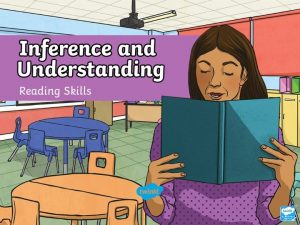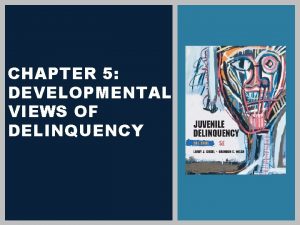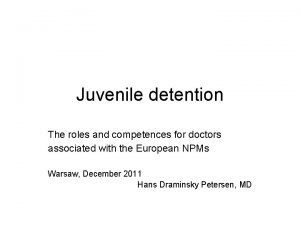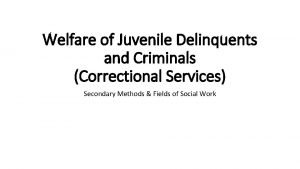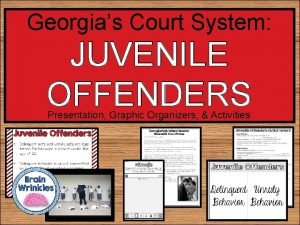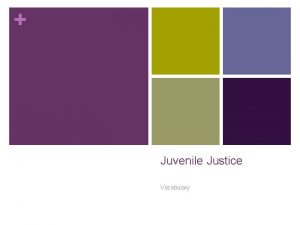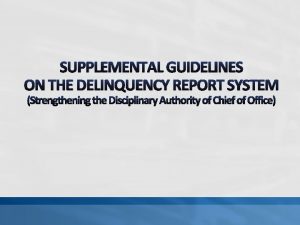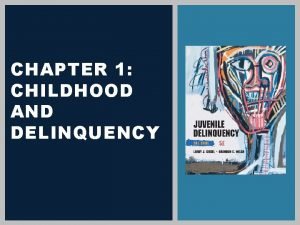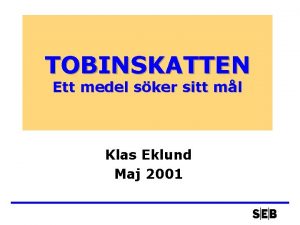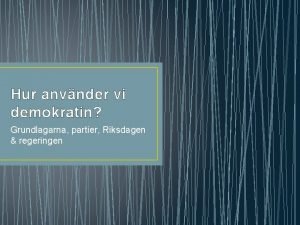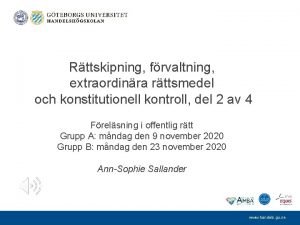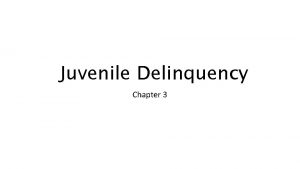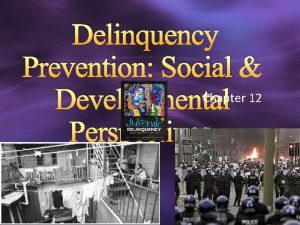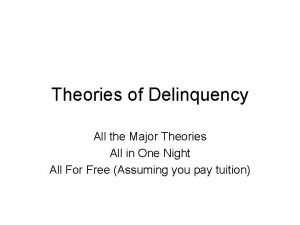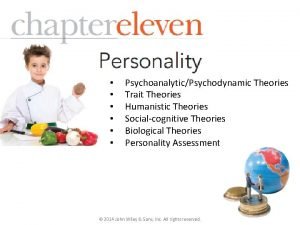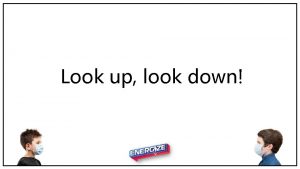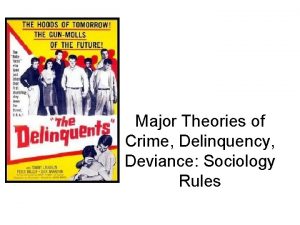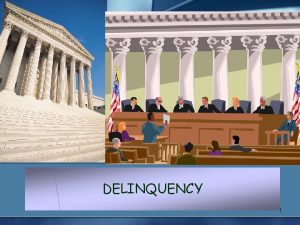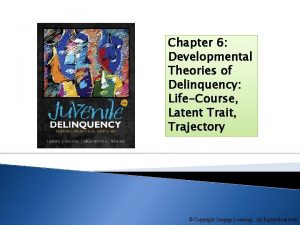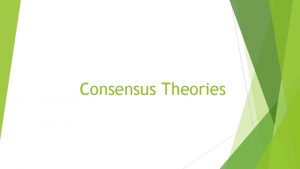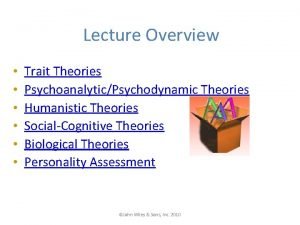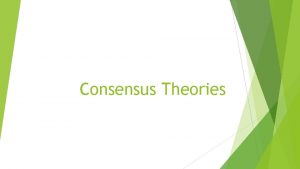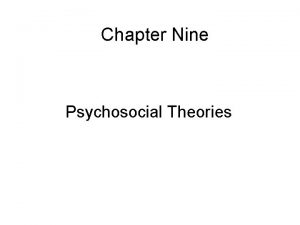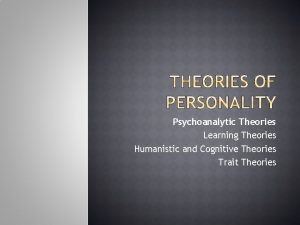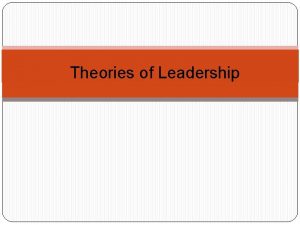Theories of Delinquency What to look for in
























- Slides: 24

Theories of Delinquency

What to look for in a theory • What are the central concepts (causes) • Is theory empirically supported? – Survey research, experimental research • Does theory make an assumption about human nature? • What are the policy implications? – Every theory has a policy implication – Every policy implication is derived from a theory

Individual Level Sociological Theories: • The Big 3 – Social Learning Theory – Social Control Theory – Strain/Anomie Theory • Others: – Deterrence Theory – Labeling Theory

Social Learning Theory • Edwin Sutherland – Differential Association Theory – Crime learned in intimate personal groups • Communication, “definitions” and techniques • Ronald Akers’ Social Learning Theory – Differential Associations, Definitions, Imitation, Differential Reinforcement (Process)

Evaluating Social Learning • Empirical Support – Delinquent Values, Delinquent Peers • Assumptions about human nature? • Policy implications? – Use learning to shape behavior away from crime and towards prosocial activity

Strain Theory • Robert K. Merton – Social Structure and Anomie – The “American Dream” is criminogenic – Modes of Adaptation • Rebellion • Innovation • Retreatism • Heavily Criticized: – Why do people adapt do strain differently? – Only explain lower class, economic crime – Poor empirical support

Evaluating Strain • Agnew’s General Strain Theory • Strain = stress, some people better equipped to handle stress • More empirical support • Policy implication of strain theories? • Assumption about human nature?

Informal Social Control Theory “Control” theories • Three Types of Informal Social Control – Direct – Indirect – Internal • Hirschi’s social bond theory • Gottfredson and Hirschi’s “Low Self-Control” • Gerald Patterson’s Social Interactional Theory

Evaluating Control Theory • Direct Control Supported Most (parenting) • Some support for “bonds” • Assumption about human nature? • Policy Implications?

Review of the “Big 3” • Social Learning Theory • Social Control Theory • Strain Theory

Deterrence Theory • Like “control” theory, but emphasize formal control – Swift Certain Severe punishment reduces crime – Specific vs. General Deterrence – “Marginal Deterrence”

Evaluating Deterrence • General Deterrence – Death penalty, clearance rates (certainty), etc • Specific Deterrence – Regular probation vs. ISP – The effect of “arrest” or “imprisonment” • Sherman’s D. V. studies • Policy Implications? • Assumption about human nature?

Rational Choice Theory • Flipside of Deterrence: – How “rational” are delinquents? • The “criminal event” and “criminal involvement” • Policy Implication of the Criminal Event – “Situational Crime Prevention”

Labeling Theory • Context of the 1960 s/1970 s • Theory with “ironic twist” – Government intervention designed to help kids actually makes matters worse • Arrest change in self concept change in behavior (secondary deviance)

Evaluating Labeling • Empirical tests difficult – Effect of arrest? (See p. 90 of book) • Assumption about human nature? • Policy Implications – OJJDP 1974 – The “Four D’s”

Recent Revisions of Labeling • “Informal” labeling • John Braithewaite – Crime Shame and Reintegration – “Reintegrative Shaming” • Deterrence and labeling theory both wrong…and both right

Macro Level Explanations • Focus on differences in group rates across some “aggregate” – State, city, neighborhood, country – Example: Social Disorganization Theory

History of Social D. • Chicago School of Crime – Theories of the “city” and the “immigrant” – Concentric Zones and city growth – Shaw and Mc. Kay • Methodology • Findings

The Decline and Resurgence • Decline in Popularity – Number of Criticisms (official data, classist/racist) • Resurgence (1980 s-present) – Recast as “social control” – Consistent empirical support Ecological Social Control Crime (Collective Efficacy) • Policy Implications? • The “Truly Disadvantaged” and Concentration of Poverty

What to Make of Poverty, Unemployment, or SES • Cox et al. Book: Delinquency spread evenly across classes: Is this true? – Self-report data (limitations) – Individual vs. Aggregate (neighborhoods) • Hinges on what type of delinquency you are talking about • New role of poverty in theory – Old theory rather simplistic (blocked opportunity) – Newer: effects on family, neighborhood, catch up with children

Psychological Theories • Behaviorism (Overlap with learning and control theories in sociology) – Operant conditioning = “direct control” – Vicarious learning = “social learning” • Personality • IQ • Cognitive – Again, overlap with sociological theory

Biological Explanations • Genetics • Neurological Deficits • Biological Harms – Pre/Perinatal risk – Toxins (Lead) • Theories? “Biosocial” – Moffitt’s Dual Taxonomy

Feminist Theory • Feminist theory and the JJS • Feminism and Theories of Delinquency – The Gender Ratio – The Gender Gap

Debates • Doing Research—Specific Web sites, what is a “good” source
 Looking down to the left
Looking down to the left Female delinquency theories
Female delinquency theories Look at the picture in activity
Look at the picture in activity Activity 1 look at the picture and complete the sentences
Activity 1 look at the picture and complete the sentences Look at the picture in activity 3
Look at the picture in activity 3 Juvenile delinquents turn heroes
Juvenile delinquents turn heroes Delinquency management meaning
Delinquency management meaning Delinquency management system
Delinquency management system What is paydex
What is paydex What is a good delinquency predictor score
What is a good delinquency predictor score Developmental views of delinquency
Developmental views of delinquency According to choice theorists offenders
According to choice theorists offenders Management of juvenile delinquency
Management of juvenile delinquency Poverty and delinquency
Poverty and delinquency Classification of juvenile delinquency
Classification of juvenile delinquency The nature and extent of delinquency chapter 2
The nature and extent of delinquency chapter 2 Juvenile offenders comprehension check answers
Juvenile offenders comprehension check answers Juvenile justice vocabulary
Juvenile justice vocabulary Delinquency report system
Delinquency report system Management of juvenile delinquency
Management of juvenile delinquency Juvenile delinquency objectives
Juvenile delinquency objectives Kontinuitetshantering i praktiken
Kontinuitetshantering i praktiken Tobinskatten för och nackdelar
Tobinskatten för och nackdelar Orubbliga rättigheter
Orubbliga rättigheter Ministerstyre för och nackdelar
Ministerstyre för och nackdelar

